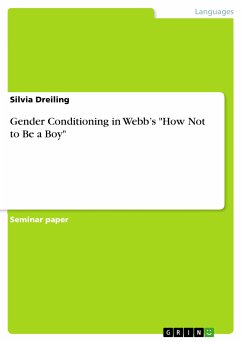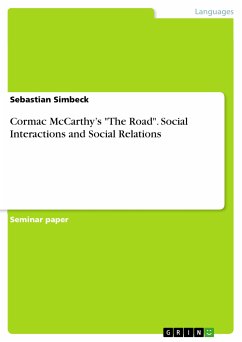
Gender Conditioning in Webb's "How Not to Be a Boy" (eBook, PDF)
Sofort per Download lieferbar
Statt: 15,95 €**
13,99 €
inkl. MwSt. und vom Verlag festgesetzt.
**Preis der gedruckten Ausgabe (Broschiertes Buch)
Alle Infos zum eBook verschenkenWeitere Ausgaben:

PAYBACK Punkte
0 °P sammeln!
Seminar paper from the year 2018 in the subject Didactics for the subject English - Literature, Works, grade: 2, University of Salzburg, language: English, abstract: Drawing attention to gender issues and gender conditioning is crucial as "gender is one of the central organising principles around which social life revolves." (Baker 4) Boudet et al. suggest that gender norms even rest upon other social norms which organise societies and community life. Besides, it can be said that gender is a component of a persons' identity, along with other components like age, social class, or religion. In R...
Seminar paper from the year 2018 in the subject Didactics for the subject English - Literature, Works, grade: 2, University of Salzburg, language: English, abstract: Drawing attention to gender issues and gender conditioning is crucial as "gender is one of the central organising principles around which social life revolves." (Baker 4) Boudet et al. suggest that gender norms even rest upon other social norms which organise societies and community life. Besides, it can be said that gender is a component of a persons' identity, along with other components like age, social class, or religion. In Robert Webb's autobiography How Not to Be a Boy, gender is the main topic. Webb particularly draws attention to the gender conditioning of men and describes what it takes to be a man. Growing up in the 1970s, he shares his experiences of gender norms, roles, and attitudes from early childhood to adulthood. Webb himself has never been good at being a boy or man, as the title suggests. In How Not to Be a Boy, Webb addresses gender issues such as not fitting one's gender role, which have influenced his own life and identity, and gives a clear message that addressing the gender conditioning of men will improve life for all. He emphasises that gender equality can only be achieved if we realise that men or boys are gendered, too, and are unavoidably involved in gender issues. In this paper, the gender conditioning of men is investigated. First, a theoretical framework is presented, which includes definitions of gender and explanations of how gender has developed, in the last decades. Then, gender in Webb's autobiography is analysed by drawing on examples from the book, and finally, there is a summary of the main findings.
Dieser Download kann aus rechtlichen Gründen nur mit Rechnungsadresse in A, B, BG, CY, CZ, D, DK, EW, E, FIN, F, GR, HR, H, IRL, I, LT, L, LR, M, NL, PL, P, R, S, SLO, SK ausgeliefert werden.













